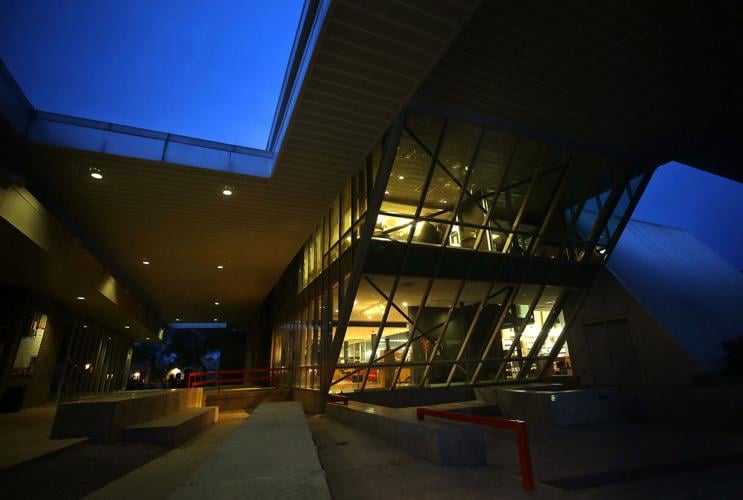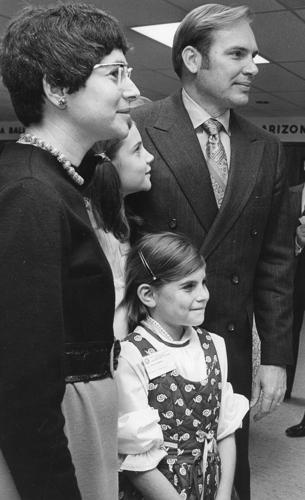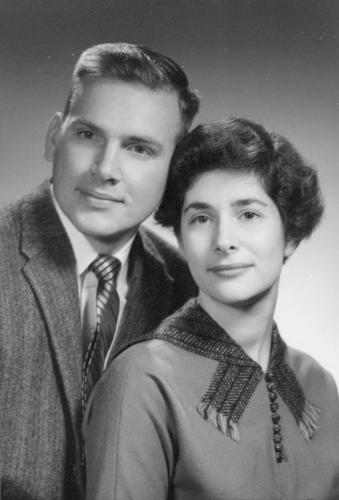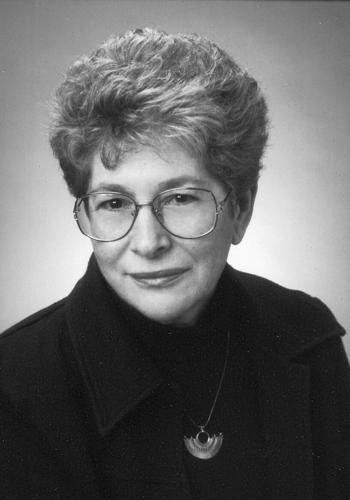She held a hard-fought Ph.D. in chemistry, but Helen Schaefer was probably best known in Tucson for her love and generous support of the arts and education.
Schaefer was a regular at performances and on the board of the Tucson Symphony Orchestra. She sang for years with the University of Arizona’s Community Chorus. And when the UA Poetry Center opened in its glittering new home in 2007, thanks to her tireless fundraising leadership, the building was named in her honor.
Schaefer died Thursday at her home in Tucson after a long battle with Parkinson’s disease. She was 89.
“The University of Arizona community has lost a true champion and leader who spent her life in exploration and in service to others,” said UA President Robert Robbins in a written statement. “Dr. Helen Schaefer was a powerhouse — a scientist and teacher, community leader, and mother of two.”
She was born Helen Marie Schwarz on April 26, 1933, and grew up in a cultured, educated and musical family in the Chicago suburb of Highland Park, Illinois.
She played piano and sang, and her twin sister, Caroline, played violin.
After earning her bachelor’s degree in chemistry from the University of Michigan, she enrolled in graduate school at the University of Illinois in Champaign-Urbana, where she was one of about three female grad students in her academic field.
She met and began dating a fellow chem student in the summer of 1957. Asked about it 65 years later, John Schaefer said he was drawn to her beauty, her sophistication and her intellect.
They married and moved West in 1958, after he graduated with a prestigious postdoctoral fellowship that landed him a position at the California Institute of Technology.
She was still working on her Ph.D. dissertation in physical chemistry at the time, so she hauled her lab equipment with her and tried to finish up while John started his career, first at Caltech and then at the University of California, Berkeley.
“She was much smarter than me,” said John, who served as UA president from 1971 to 1982. “If there’s one bit of advice I would give young men, it’s marry a woman who is smarter than you.”
VLNTR for life
The Schaefers traded California for Tucson in 1960, lured by better opportunities for career advancement at the growing university here.
“They camped at the Grand Canyon on the way down,” said Susan Schaefer Kliman, John and Helen’s youngest daughter.
It didn’t take long for Tucson to win the couple over.
“They fell in love with it. My mother loved the heat,” Kliman said. “They never really considered moving anywhere else.”
The Schaefers both worked at the UA initially — he as an assistant professor and she as a teaching assistant — but she was forced to quit the following year because of university nepotism rules that prohibited spouses from working in the same department.
After that, she set her unfinished dissertation aside to start a family and advocate on behalf of their adopted home.“She started getting very active in the community,” John said.
When Schaefer wasn’t driving her girls to swim meets, she served on the board for both the YWCA and YMCA. When her daughters joined the Girl Scouts, she joined the group’s citywide council.
For more than five decades, she volunteered her time with — and sometimes led — too many community boards to name, including ones devoted to school desegregation, child welfare, higher education, health care, the arts and women in science.
For years, John said, the personalized UA license plate on her car read VLNTR.
She gave a lot more than just her time. Schaefer’s financial generosity earned her a spot in the UA Foundation’s Founders Society, which recognizes donors whose cumulative giving reaches $500,000 or more.
There are scholarships in Schaefer’s name at the UA for women studying science, engineering or mathematics and at the University of Michigan for chemistry majors.
“She believed that having money is a real responsibility. Charity was just a defining part of her family, her culture and herself,” John said.
“We were raised in this household where giving back was never a question,” Kliman added.
Poetic justice
When the UA Poetry Center was looking for a permanent home on campus, she helped lead the effort to build no mere repository but a $7 million architectural wonder worthy of housing one of the nation’s largest, stand-alone collections of poetry.
Tyler Meier, executive director of the center, said a lot of people donated money and helped with the fundraising campaign, but Schaefer’s “astonishing leadership” is why her name ended up on the building.
Sinking money into a palace for poetry simply wasn’t a priority for everyone at a research-driven, land-grant institution like the UA, Meier said. “But Helen was adamant that this was a need and that it would distinguish the university.”
After the center’s new home was finished — on Helen Street, coincidentally enough — Schaefer remained a vital and committed supporter, even in later years when her failing health kept her from visiting, Meier said.
“She always wanted to know what was going on with the center,” he said. “Every nonprofit needs a champion, and we have been so, so lucky to have someone like Helen as our champion.”
Apparently, letting things go wasn’t Schaefer’s strong suit.
Sometime around 1975, the serial volunteer and philanthropist decided to do something for herself, something that had been eating at her. She left her husband at home with the girls and returned to the University of Illinois, where she finally completed her dissertation over the course of two summers.
“It was unfinished business, and Helen didn’t like unfinished things,” John said.
She officially earned her doctorate in 1978 with the publication of “Isotope Effects: Metal Ion Oxidations in Solution.” It would never be a bestseller, her organic chemist of a husband said with a laugh, but it stands as a testament to her lifelong dedication to science and to seeing things through.
It certainly left an impression on Kliman, who said she has been trying to live up to her mother’s example her whole life.
“She was an incredible role model and a really remarkable woman,” Kliman said.
Shaefer is survived by her husband, John, of Tucson; sister Caroline Siegel and brother-in-law Ron Siegel of Lincolnshire, Illinois; sister-in-law Anita Meyer of Lindenhurst, New York; daughter Ann Schaefer-Reid and son-in-law Andy Reid of Hartford, Connecticut; and daughter Susan Schaefer Kliman and son-in-law Douglas Kliman of Fargo, North Dakota, and grandson Randall Kliman of Atlanta.
The family plans to hold a celebration of her life in late fall, possibly at the UA Poetry Center that bears her name.








